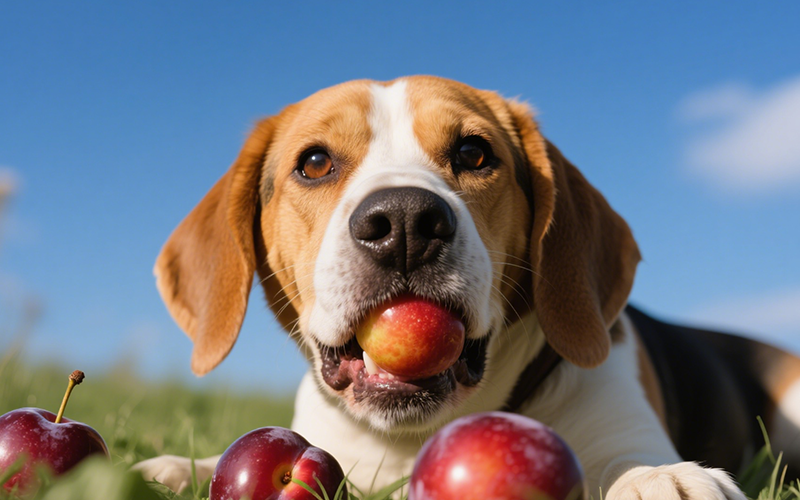Can Dogs Eat Plums? Here's What You Should Know
- 8 Apr 2025 15:34
Plums are sweet, juicy, and packed with nutrients for humans, but are they safe for dogs? While plums aren’t inherently toxic, there are several important risks that every dog owner should be aware of before sharing this fruit with their furry friend.

Can Dogs Eat Plums? 🤔
No, dogs should not eat plums, particularly the pit and skin of the fruit. While the flesh of the plum is not toxic, it can still cause digestive upset in dogs, and the pit can pose serious health risks. It's best to avoid giving your dog plums altogether due to these potential hazards.
The Risks of Plums for Dogs 🚨
The Pit: A Serious Choking Hazard ⚠️
The most significant risk of feeding plums to your dog is the pit inside the fruit. The pit can be a choking hazard, especially for smaller dogs. If swallowed, it can also cause a blockage in the digestive system, which may require surgery to remove. Additionally, the pit can damage the esophagus or other parts of the digestive tract if ingested whole.Cyanide in Plum Pits 🧪
Plum pits contain cyanogenic compounds, which can release cyanide when metabolized. While the amount of cyanide in a single plum pit is likely not lethal to most dogs, it is still highly toxic and should be avoided at all costs. Cyanide poisoning can cause symptoms such as:Dilated pupils 👀
Excessive drooling 🤤
Vomiting 🤢
Difficulty breathing 😤
Shock 😳
Digestive Upset from the Flesh 💥
The flesh of the plum itself is not toxic, but it can cause gastrointestinal upset if consumed in large amounts. Eating too much fruit can lead to symptoms like:Diarrhea 💩
Bloating 😖
Gas 💨
Stomach discomfort 🐾
The high sugar content in plums may also not be suitable for dogs with certain health conditions, such as diabetes or obesity.
Plum Skin 🟠
The skin of a plum can also be difficult for some dogs to digest. While it's not toxic, it may contribute to digestive discomfort or even a possible blockage, especially if your dog is prone to eating things they shouldn’t.
What to Do if Your Dog Eats a Plum Pit 🚨
If your dog has eaten a plum pit, it’s important to keep a close eye on them. If you notice any signs of distress such as vomiting, difficulty breathing, or a lack of energy, contact a veterinarian immediately. Time is crucial in preventing more serious effects from cyanide poisoning or a digestive obstruction.
If your dog has eaten just a small amount of plum flesh and the pit was removed, they might experience some mild stomach upset, but they should generally recover without the need for medical attention. Just make sure they have access to fresh water and monitor them for any signs of discomfort.
Safer Fruit Options for Dogs 🍎🍓
If you’re looking for a tasty, dog-friendly fruit to treat your dog, there are many safer options to choose from:
Apples 🍏
Apples (without the seeds or core) are a safe and healthy treat for dogs. They’re high in fiber and vitamin C and can help freshen your dog’s breath.Blueberries 🫐
Blueberries are small, nutrient-dense, and packed with antioxidants. They’re a great low-calorie snack for dogs.Bananas 🍌
Bananas are safe for dogs in moderation. They’re high in potassium and fiber, which can aid in digestion.Watermelon 🍉
Watermelon is hydrating and safe for dogs, as long as you remove the seeds and rind.Pineapple 🍍
Pineapple is another safe option. It’s packed with vitamin C and bromelain, which can aid in digestion.
How to Safely Treat Your Dog 🍖
While fruits can be a healthy addition to your dog’s diet, it’s important to feed them in moderation and remove any dangerous parts (like seeds, pits, and skins). Always introduce new foods gradually to prevent any stomach upset. Additionally, avoid adding sweeteners, syrups, or seasoning to your dog’s food.
How PettureX Can Help 🧠
If you’re unsure whether a particular food is safe for your dog, PettureX is a fantastic tool. With 24/7 consultations and pet image recognition, you can get expert advice on which fruits and other foods are appropriate for your dog. PettureX can also help guide you on portion sizes and safe feeding practices.
Conclusion: Can Dogs Eat Plums? ❌
No, dogs should not eat plums due to the risks posed by the pit, the potential for cyanide toxicity, and the possibility of digestive upset. If you want to share a fruit with your dog, there are many safer options to choose from, like apples, blueberries, and watermelon. Always make sure to remove pits, seeds, and skins, and offer fruit in moderation.
If you’re concerned about anything your dog eats, PettureX is available to provide 24/7 consultation and guidance on your pet’s health and diet.
Need help with your dog’s health or diet? Try PettureX for 24/7 consultations and expert care! 🐶💚
Related

Can Dogs Eat Peaches? Vet Explains Benefits, Cyanide Risks & Safe Serving
- 16 Apr 2025
Can Dogs Eat Mulberries? Vet Explains Safety, Benefits & Potential Risks
- 16 Apr 2025
Can Dogs Eat Mozzarella? Vet Explains the Cheesy Truth (Risks & Benefits)
- 16 Apr 2025
Can Dogs Eat Maple Syrup? The Sugary Truth & Why Vets Advise Against It
- 16 Apr 2025
Can Dogs Eat Mango Skin? Vet Explains Why It's a Risky Chew!
- 16 Apr 2025
Can Dogs Eat Mac n Cheese? Vet Explains Why This Comfort Food Is Unsafe!
- 16 Apr 2025
Can Dogs Eat Liver? Vet Guide to This Nutrient-Dense Organ Meat (Benefits & Risks!)
- 16 Apr 2025
Can Dogs Eat Lamb? Vet Insights on This Nutritious Meat Option
- 16 Apr 2025
Can Dogs Eat Licorice? The Sweet Danger & Glycyrrhizin Risk Explained by Vets
- 16 Apr 2025
Can Dogs Eat Jelly? The Sweet Truth About Sugar, Xylitol & Why Vets Say No!
- 16 Apr 2025
